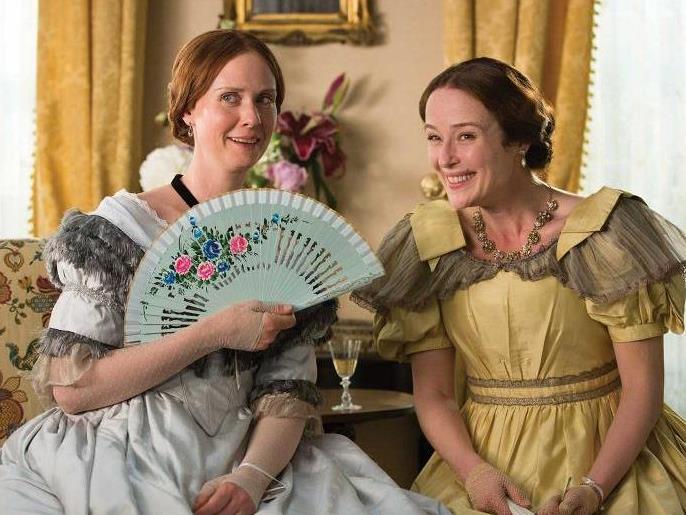In crafting portraits of women who lived in convention-abiding times but flouted the norm in their own ways, writer/director Terence Davies (The Deep Blue Sea) has adopted two different approaches in as many years. With Sunset Song, an adaptation of the early twentieth century Scottish novel of the same name, he favoured the lyrical and the expressive as he followed his fictional heroine’s spirited attempts to find her place in the patriarchy-dominated world. Bringing the life of American poet Emily Dickinson to the screen comes with greater restraint, befitting the structure and formality that dictated much her New England existence, the not-quite-forbidden but hardly celebrated nature of her work while she was alive, and the eventual reluctance that shaded her interactions with others.
And yet, for all of A Quiet Passion’s stylistic and tonal dissimilarities to its immediate predecessor in Davies’ oeuvre, both features share the quality that his latest work champions in its title: passion. Here, an almost foreboding, oppressive sense of rigidity isn’t just a choice – it’s a necessity to truly emphasise the fire that rages inside the film’s protagonist. Davies provides more than a hint of Dickinson’s rebellious nature at the outset, when she’s branded a ‘no hoper’ as she’s all but forced out of college as a young woman (Emma Bell, See You in Valhalla). He then continues to let it simmer, as she grows into womanhood (now played by James White’s Cynthia Nixon) finds comfortable company with her sister Livinia (Jennifer Ehle, Little Men), warms to the outwardly impudent Vryling Buffam (Catherine Bailey, TV’s And Then There Were None), and often worries her father (Keith Carradine, Madam Secretary) with her forceful opinions.
For the most part, however, it’s how Dickinson’s personality and perspective bristles against her stifling confines that proves the heart of A Quiet Passion – both in the society she lives within, even in a family that’s often indulgent of and open to her ways; and in a feature fashioned with the utmost meticulousness and aesthetic rigour. Courtesy of director of photography Florian Hoffmeister (Mortdecai) and editor Pia Di Ciaula (Belle), the film places its central character within stately but suffocating confines, then watches patiently as the cracks begin to form in what must’ve initially seemed close to the perfect likeness of a proper and orderly life in its time.
Accordingly, A Quiet Passion is an internalised piece cast open to viewing eyes, while charting a contrasting trajectory to its eventually reclusive key figure; that its images lose their brightness over time and with increased scrutiny says plenty. Sometimes, particularly in a movie that reaches 125 minutes in duration, that results in a film that takes a little too much pause within its purposefully mannered atmosphere, though often, it’s riveting, revelatory and laced with fast-spoken, comic energy. They’re extremes, to be certain, but they also place the audience as firmly in the shoes of Dickinson as a biopic can, aping her experiences spitting witty retorts out in conversation, feeling every drop of tension when her behaviour defies expectation, and retreating not just into her home, but into her room, when both become her only modes of operation. And, as Davies weaves the poet’s own verse throughout, overlaid as voiceover, it ensures that the full meaning of her words is truly felt.
So it is that Nixon plays a hand in shaping the movie’s fortunes, espousing dialogue as intricate as every scene’s design and framing, and saying as much with the quiver of her lip as the feature’s detailed and precise staging. As Dickinson continues to cast herself as no one and talk of living a minor life, all while scribbling text that will eventually prove the opposite, there’s a haunting quality to the lead performance in several ways. Nixon’s portrayal is tinted by unshakeable melancholy and vulnerability, despite concerted efforts to appear otherwise, that colours every moment from the time that she morphs, from Bell, into the primary role. In the process, it lingers in its inner turmoil, which is so clearly borne of strong sentiments left to fester – and, like the fervour Davies brings to the film, perfectly embodies A Quiet Passion’s moniker.
Rating: 3 1/2 stars out of 5
A Quiet Passion
Director: Terence Davies
UK | Belgium, 2016, 125 mins
Rating: PG
In general release: 2017
Distributor: Palace Films
BBC First British Film Festival 2016
Sydney – October 25 – November 16
Canberra – October 25 – November 16
Melbourne – October 26 – November 16
Perth – October 27 – November 16
Brisbane – October 27 – November 16
Adelaide – November 3 – 23
Actors:
Director:
Format:
Country:
Release:





